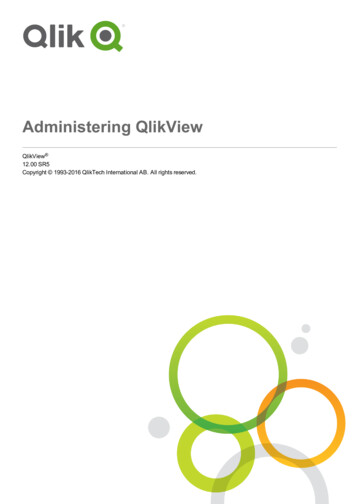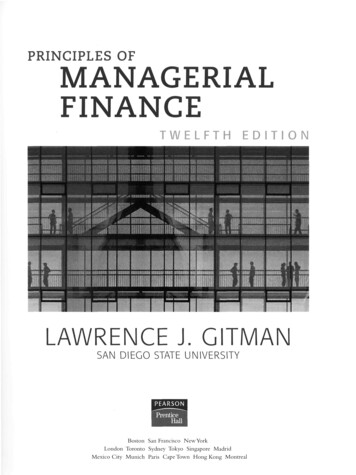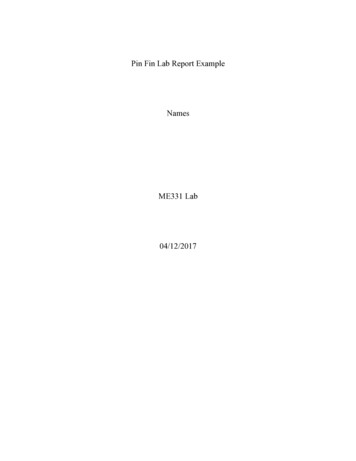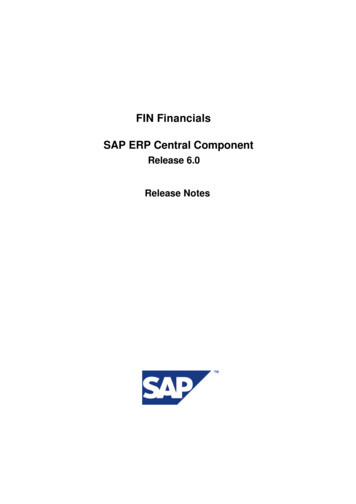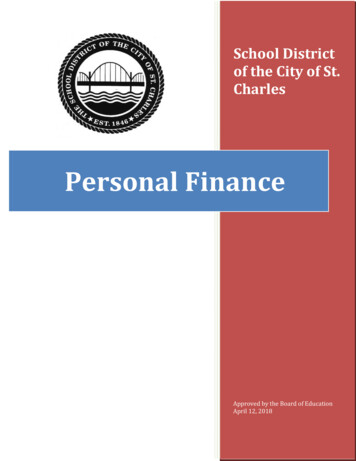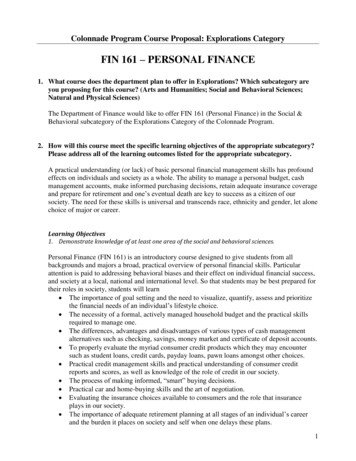
Transcription
Colonnade Program Course Proposal: Explorations CategoryFIN 161 – PERSONAL FINANCE1. What course does the department plan to offer in Explorations? Which subcategory areyou proposing for this course? (Arts and Humanities; Social and Behavioral Sciences;Natural and Physical Sciences)The Department of Finance would like to offer FIN 161 (Personal Finance) in the Social &Behavioral subcategory of the Explorations Category of the Colonnade Program.2. How will this course meet the specific learning objectives of the appropriate subcategory?Please address all of the learning outcomes listed for the appropriate subcategory.A practical understanding (or lack) of basic personal financial management skills has profoundeffects on individuals and society as a whole. The ability to manage a personal budget, cashmanagement accounts, make informed purchasing decisions, retain adequate insurance coverageand prepare for retirement and one’s eventual death are key to success as a citizen of oursociety. The need for these skills is universal and transcends race, ethnicity and gender, let alonechoice of major or career.Learning Objectives1. Demonstrate knowledge of at least one area of the social and behavioral sciences.Personal Finance (FIN 161) is an introductory course designed to give students from allbackgrounds and majors a broad, practical overview of personal financial skills. Particularattention is paid to addressing behavioral biases and their effect on individual financial success,and society at a local, national and international level. So that students may be best prepared fortheir roles in society, students will learn The importance of goal setting and the need to visualize, quantify, assess and prioritizethe financial needs of an individual’s lifestyle choice. The necessity of a formal, actively managed household budget and the practical skillsrequired to manage one. The differences, advantages and disadvantages of various types of cash managementalternatives such as checking, savings, money market and certificate of deposit accounts. To properly evaluate the myriad consumer credit products which they may encountersuch as student loans, credit cards, payday loans, pawn loans amongst other choices. Practical credit management skills and practical understanding of consumer creditreports and scores, as well as knowledge of the role of credit in our society. The process of making informed, “smart” buying decisions. Practical car and home-buying skills and the art of negotiation. Evaluating the insurance choices available to consumers and the role that insuranceplays in our society. The importance of adequate retirement planning at all stages of an individual’s careerand the burden it places on society and self when one delays these plans.1
Proper estate planning techniques to address end-of-life emotional, familial and societalissues.2. Apply knowledge, theories, and research methods, including ethical conduct, to analyze problemspertinent to at least one area of the social and behavioral sciences.Students in FIN 161will meet this objective by addressing the learning objectives of theprevious section and applying these concepts to their own lives. At each step of the learningprocess in the course where different concepts are presented, class discussion addressesnumerous social and behavioral questions. Examples of these might be: Who/what determines the “rule of thumb” for the value of an engagement ring? What is the role of a banking institution in our lives? How do we manage such arelationship? How does government interact with this relationship? How/when does society seem to suggest we should purchase our first home/car?How/when should we as individuals make this determination? Do we have an obligation to our fellow citizens to carry adequate liability insuranceon our Auto Policies? What defines “adequate?” What is the concept of “retirement?” How has this concept changed over the courseof time? What responsibility do we have to provide for our future selves? What ofgovernment? How should we address these needs?3. Understand and demonstrate how at least one area of the social and behavioral sciencesconceptualizes diversity and the ways it shapes human experience.This objective is met by the following concepts: The unique role that women must play in managing their personal finances andtheir families. The unique financial challenges presented to minorities and tools to overcomethem.4. Integrate knowledge of at least one area of the social and behavioral sciences into issues ofpersonal or public importance.This objective is exhaustively met by addressing the personal financial issues faced by all individualsin this country and the steps they must take to address them. Furthermore, attention is given toproblems faced by society from those who fail to address these needs for themselves.5. Communicate effectively using the language and terminology germane to at least one area of thesocial and behavioral sciences.FIN 161 will help students address complex, life affecting issues and problems using the toolslearned during the course. Material is presented using practical, real-world expmples pertinentto the current and future lives of students. Through this, students will be able to identifypersonal finance issues in their lives and careers and apply to analytical tools learning in thiscourse to their daily living needs.3. Syllabus statement of learning outcomes for course. NOTE: In multi-section courses, thesame statement of learning outcomes must appear on every section’s syllabus.2
Course Description: This course is designed to serve the personal finance needs ofstudents regardless of their major fields. Practical applications in person and familyfinancial planning, including credit, buying, borrowing, banking, insurance,investments, taxation, estate planning and home ownership are discussed. Thematerial will be kept basic in nature and a business background is not required. Thisdoes not mean the material is EASY. Any concepts introduced will be no moredifficult that those faced by individuals in their “real” lives.By its nature, finance involves mathematics. An adequate grasp of simple algebrais a must. Some statistical analysis will be required but any statistics used will bereviewed.Course Objective: To provide and develop the necessary tools to allow the student tobecome an informed citizen and financially responsible member of society especially as itrelates to the personal financial aspects of the student’s current and future life. This coursefulfills the Social and Behavioral Science requirement in the Explorations category of theColonnade Program. To meet the requirement of the courses in this category, the course hasthe following learning objectives:1. Demonstrate knowledge of at least one area of the social and behavioral sciences.2. Apply knowledge, theories, and research methods, including ethical conduct, to analyzeproblems pertinent to at least one area of the social and behavioral sciences.3. Understand and demonstrate how at least one area of the social and behavioral sciencesconceptualizes diversity and the ways it shapes human experience.4. Integrate knowledge of at least one area of the social and behavioral sciences into issuesof personal or public importance.5. Communicate effectively using the language and terminology germane to at least onearea of the social and behavioral sciences.Course OutlineSo that students may be best prepared for their roles in society, students will learn The importance of goal setting and the need to visualize, quantify, assess and prioritizethe financial needs of an individual’s lifestyle choice.The necessity of a formal, actively managed household budget and the practical skillsrequired to manage one.The differences, advantages and disadvantages of various types of cash managementalternatives such as checking, savings, money market and certificate of deposit accounts.To properly evaluate the myriad consumer credit products which they may encountersuch as student loans, credit cards, payday loans, pawn loans amongst other choices.Practical credit management skills and practical understanding of consumer creditreports and scores, as well as knowledge of the role of credit in our society.The process of making informed, “smart” buying decisions.Practical car and home-buying skills and the art of negotiation.Evaluating the insurance choices available to consumers and the role that insuranceplays in our society.The importance of adequate retirement planning at all stages of an individual’s careerand the burden it places on society and self when one delays these plans.3
Proper estate planning techniques to address end-of-life emotional, familial and societalissues.3. Brief description of how the department will assess the course for these learningobjectives.The Department of Finance will assess the effectiveness of this course by giving regular assessmentof topics as determined by the Director of the Financial Planning Program, with allowances madefor individual instructor preference, within limits. Uniformity of learning outcomes will be achievedthrough assessment of learning outcomes of students of Personal Finance regardless of instructor.This will be achieved through standardized levels of examination as varying points of a givensemester.Learning objectives of the course will be deemed to have been met when 70% of students receive apassing grade on a goal-setting assignment, budgeting project and retirement project. Furthermore,certain standard questions will be given on exams, regardless of instructor, and learning objectiveswill have been met if 70% of students correctly answer.5. How many sections of this course will your department offer each semester?At a minimum, the Department of Finance will offer two sections of FIN 161 per semester with 90seats. Enrollment in an individual section of the course is currently limited by seating capacity ofclassrooms in Grise Hall. Additional offerings of the course are regularly offered during SummerSessions with capacity for 40 students.6. Please attach sample syllabus for the course. PLEASE BE SURE THE PROPOSALFORM AND THE SYLLABUS ARE IN THE SAME DOCUMENT.See below for sample syllabus information.4
PERSONAL FINANCEFIN 161 - SECTION 001Grise Hall, Room 438Tuesday & Thursday 11:10 – 12:30 p.m.August 27, 2013 – December 9, 2013You are responsible for knowing and understanding the contents of this syllabus. This syllabusrepresents a contract between the student and the instructor.INSTRUCTORMr. Andrew J. Head, MA, CFP ,Director, Financial Planning ProgramDirector, Center for Financial SuccessOFFICE325 Grise HallPHONE270.745.4733EMAILandrew.head@wku.edu (Best contact between classes)OFFICE HOURSVarious times by appointmentREQUIRED MATERIALSTEXTPersonal Finance: Turning Money into Wealth, 6/E (or newer) with MyFinanceLab-Arthur J. KeownISBN-10: 0132719169ISBN-13: 9780132719162Purchasing OptionsNew Including MyFinanceLab VariousUsed MyFinanceLab Used Price 55Loose Leaf MyFinanceLab 110eText MyFinanceLab 100CALCULATORTexas Instruments BAII PlusAvailable for approximately 28 at various stores5
To register for FIN 161-M01 May 2013:1. Go to pearsonmylabandmastering.com.2. Under Register, click Student.3. Enter your instructor’s course ID: head07615, and click Continue.4. Sign in with an existing Pearson account or create an account:· If you have used a Pearson website (for example, MyITLab, Mastering,MyMathLab, or MyPsychLab), enter your Pearson username and password.Click Sign in.· If you do not have a Pearson account, click Create. Write down your newPearson username and password to help you remember them.5. Select an option to access your instructor’s online course:· Use the access code that came with your textbook or that you purchasedseparately from the bookstore.· Buy access using a credit card or PayPal.· If available, get 14 days of temporary access. (Look for a link near the bottomof the page.)6. Click Go To Your Course on the Confirmation page. Under MyLab & MasteringNew Design on the left, click FIN 161-001 F13 11:10-12:30 TR to start yourwork.Retaking or continuing a course?If you are retaking this course or enrolling in another course with the same book,be sure to use your existing Pearson username and password. You will not need topay again.To sign in later:1. Go to pearsonmylabandmastering.com.2. Click Sign in.3. Enter your Pearson account username and password. Click Sign in.4. Under MyLab & Mastering New Design on the left, click FIN 161-001 F1311:10-12:30 TR to start your work.Additional InformationSee Students Get Started on the website for detailed instructions onregistering with an access code, credit card, PayPal, or temporary access.6
STUDENTS WITH DISABILITIESIn compliance with university policy, students with disabilities who requireaccommodations (academic adjustments and/or auxiliary aids or services) for this coursemust contact the Office for Student Disability Services in DUC A-200 of the StudentSuccess Center in Downing University Center. The phone number is 270-745-5004.Please DO NOT request accommodations directly from the professor or instructor withouta letter of accommodation from the Office for Student Disability Services.7
COURSE DESCRIPTIONCourse Description: This course is designed to serve the personal finance needs of studentsregardless of their major fields. Practical applications in person and family financial planning,including credit, buying, borrowing, banking, insurance, investments, taxation, estate planningand home ownership are discussed. The material will be kept basic in nature and a businessbackground is not required. This does not mean the material is EASY. Any conceptsintroduced will be no more difficult that those faced by individuals in their “real” lives.By its nature, finance involves mathematics. An adequate grasp of simple algebra is amust. Some statistical analysis will be required but any statistics used will be reviewed.Course OutlineSo that students may be best prepared for their roles in society, students will learn The importance of goal setting and the need to visualize, quantify, assess andprioritize the financial needs of an individual’s lifestyle choice.The necessity of a formal, actively managed household budget and the practical skillsrequired to manage one.The differences, advantages and disadvantages of various types of cash managementalternatives such as checking, savings, money market and certificate of depositaccounts.To properly evaluate the myriad consumer credit products which they may encountersuch as student loans, credit cards, payday loans, pawn loans amongst other choices.Practical credit management skills and practical understanding of consumer creditreports and scores, as well as knowledge of the role of credit in our society.The process of making informed, “smart” buying decisions.Practical car and home-buying skills and the art of negotiation.Evaluating the insurance choices available to consumers and the role that insuranceplays in our society.The importance of adequate retirement planning at all stages of an individual’s careerand the burden it places on society and self when one delays these plans.Proper estate planning techniques to address end-of-life emotional, familial andsocietal issues.METHOD OF INSTRUCTIONThis course will be conducted in a lecture/discussion format, primarily involving criticalthinking and problem solving. Students are expected to take an active role, both in theclassroom and out of class.8
COURSE OBJECTIVETo provide and develop the necessary tools to allow the student to become an informedcitizen and financially responsible member of society especially as it relates to the personalfinancial aspects of the student’s current and future life.GENERAL EDUCATION REQUIREMENT This course fulfills the Social and BehavioralScience requirement in the Explorations category of the Colonnade Program. To meet therequirement of the courses in this category, the course has the following learningobjectives:6. Demonstrate knowledge of at least one area of the social and behavioral sciences.7. Apply knowledge, theories, and research methods, including ethical conduct, toanalyze problems pertinent to at least one area of the social and behavioral sciences.8. Understand and demonstrate how at least one area of the social and behavioralsciences conceptualizes diversity and the ways it shapes human experience.9. Integrate knowledge of at least one area of the social and behavioral sciences intoissues of personal or public importance.10. Communicate effectively using the language and terminology germane to at least onearea of the social and behavioral sciences.Topics in this class demonstrate how society and individuals benefit when individuals takeresponsibility for personal financial decisions, how planning makes for effective decisions, andwill discuss strategies to consider when planning. We will explore personal behaviors that bothexacerbate and ameliorate not only individual situations but societal problems, especially in thefinancial area.While the personal finance area can be viewed as highly technical in nature, in the end thefinancial problems that arise in people’s lives often result from behavioral imperfections andimperfections in the financial structures that individuals must deal with in their everyday life.This course will address some of these imperfections and develop strategies for dealing withthem. There is both a social and behavioral component to the personal finance area, and we willaddress them in this course.IMPORTANT DATESSeptember 3 – Last day to add a class. Last day to drop a class without a grade. Last day tochange a class from audit to credit. Last day to receive 100% refund for a class.September 9 – last day to receive 50% refund.September 16 – last day to receive any refund for the 2013 Fall semester.October 3 – NO CLASS - Fall BreakOctober 16 – Last day to drop with a W, change from CR to AUNovember 28 – NO CLASS – Thanksgiving9
GRADINGEXAMSThere will be two exams and a final exam. The exams will be primarily in a multiple-choiceformat. Students are responsible for bringing a Scantron and your financial calculator to eachexam. Calculators may not be shared during exams and language translators are not permitted.Exams cover ALL assigned reading material whether or not covered in class and class lectures.I will retain all exams. Failure to return an exam after the in-class review will result in an F forthe course.EXAM SCHEDULE AND VALUEPointsExam 1Exam 2Final Exam125125125Date (Tentative)October 1November 12December 9 (MONDAY @ 8AM)CHAPTER HOMEWORK ASSIGNMENTSAssignments will be posted on and must be submitted through MyFinanceLab. Points for eachassignment depend on the number of questions assigned. Homework assignments can beresubmitted an unlimited number of times, up until the due date/time. I will not reopen missedassignments for any reason.SEMESTER BUDGET PROJECT 80 PointsIn Chapter 2 we will discuss (amongst other things) proper budgeting techniques. Due to the factthat a solid approach to budgeting is absolutely pivotal to your long-term financial success, whiletaking this course it is important that you get to practice with software packages that will makeyour future financial life a LOT easier. Because this is such an important step in financialsuccess, you will be required to use the YouNeedABudget software package (this will bediscussed in class) to record your financial transactions and category budgets. Other software canbe used ONLY with prior permission. You will be submitting sharing your budgets with methrough the “Cloud” using Dropbox. Details of this will be discussed in class. This MUST beshared with me no later than the first exam. Late submissions will NOT be accepted.RETIREMENT PROJECT 50 PointsThere will be a project assigned where you will be required to calculate your required retirementcontributions under various scenarios. This will be assigned further into the course.COURSE GRADE:2 Exams @ 125 250 points1 Final Exam @ 125 125 pointsHomework 80 points (this is an estimate)Retirement Project 50 pointsBudget Project 80 pointsParticipation & Attendance 25 points10
TOTAL 625 (This is an approximation because there may be more or fewer points fromquizzes and other assignments)GRADES: Failure to take ALL exams will result in an “F” for the course, otherwise your gradewill be based on the total points you earn in the course and determined by the following FIXEDscale:A: 90-100% of total pts.; B: 80-89%; C: 70-79%; D: 55-69%; F: 58%11
CLASS POLICIESo I do not give make up exams. If you have extreme circumstances that preventyou from taking the exam when scheduled, you must contact me at least 24hours in advance and arrange for an alternative time to take a more difficultexam. The alternative exam must be taken before exams are handed back(usually the following class period) and will only be accepted for a grade withproof of excuse. Alternative exams will be different and harder than theoriginal.o Quizzes and in-class assignments cannot be made up. Absences on thesedays result in a zero.o You are responsible for all material covered in class as well as obtaininghandouts. If you miss class, it is your responsibility to get notes and handoutsfrom one of your classmates. I only provide handouts once.o Attendance and preparation are extremely important. The typical college courserequires 2-3 hours of preparation outside of class for every hour spent in class.o I will take attendance using a seating chart. I will begin deducting points afterone unexcused absence and I will stop grading after 5 absences.o There are no individual extra credit projects. Period. Everyone’s grade for thecourse is based on the same material.o Do NOT anticipate any curving of grades.o Incompletes are not given except under extreme circumstances.o If you quit coming to class and fail to formally drop the class, you will get an For potentially an FN.o Turn off all beepers and cell phones before coming into the classroom.This means ringers as well as texting! The first incidence of class interruptionwill result in a warning. For subsequent offenses, the student will be asked toleave must get my permission before returning to class.o Computer use in class is permitted for note taking and other class-related items.Use of a computer is a privilege, though, and the moment it becomes adistraction to me or others around you, you will lose that privilege permanentlyfor the semester.o While I understand some conversation with those around you is necessary attimes, please keep the conversations to a minimum. If chatting becomes a12
distraction to me or your classmates you will be asked to leave and must get mypermission before returning to class.o Please arrive at class ready to work on time.o Bring your calculator to classCOURSE SEQUENCE8/27/2013 T8/29/2013 ThIntro / 11,29/3/2013 T9/5/2013 Th22 YNAB9/10/2013 T9/12/2013 ThNO CLASS39/17/2013 T9/19/2013 Th34, 59/24/2013 T9/26/2013 Th5510/1/2013 T10/3/2013 ThEXAM IFALL BREAK10/8/2013 T10/10/2013 Th6610/15/2013 T10/17/2013 Th8810/22/2013 T10/24/2013 Th8, 9910/29/2013 T10/31/2013 Th91311/5/2013 T11/7/2013 Th1313, 1311/28/201312/3/201312/5/2013TEXAM IITh15T15Th15,16T16Th THANKSGIVINGT16, 17Th17, 1812/9/2103 MConferenceCh.'s 1, 2, 3, 5NO CLASSCh.'s 6, 8, 9NO CLASSFINAL EXAM13
ChapterTitle1The Financial Planning Process (5 HW points)2Measuring Your Financial Health and Making a Plan (5 HW points)3Understanding and Appreciating the Time Value of Money (10)5Managing Your Money (10)6Using Credit Cards: The Role of Open Credit (5)7Using Consumer Loans: The Role of Planned Borrowing (6)8The Home and Automobile Decision (8)9Life & Health Insurance (TBD)13Investing in Stocks (5)14Investing in Bonds and Other Alternatives (7)15Mutual Funds: An Easy Way to Diversify (6)16Retirement Planning (6)17Estate Planning (5)For successful completion of the course, you should be familiar with (1) ALL material in thechapter listed, (2) ALL end of chapter questions, (3) suggested end of chapter Financial PlanningExercises (FPE), and (4) ALL lecture material related to the listed chapters.14
Personal Finance (FIN 161) is an introductory course designed to give students from all backgrounds and majors a broad, practical overview of personal financial skills. Particular attention is paid to addressing behavioral biases and their effect on individual financial success,

